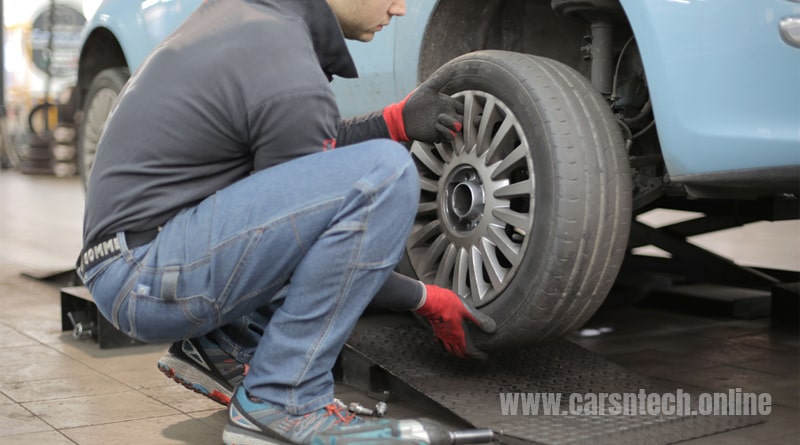Tips On How To Choose The Right Tire for Your Vehicle: Enhance Performance and Safety
Choosing the perfect set of tires for your vehicle isn’t just about aesthetics – it profoundly impacts your vehicle’s performance, fuel efficiency, and overall safety. In this comprehensive guide, we’ll delve into the key aspects to consider when selecting tires that align with your driving needs and preferences.
Introduction
Your vehicle’s tires play a pivotal role in its overall performance, safety, and fuel efficiency. Choosing the right set of tires involves more than just looking at the aesthetics – it’s about understanding the technical aspects that contribute to a smooth and secure driving experience.
Tubeless vs. Tube-type Tires: The Advantages of Going Tubeless
In the battle of tubeless vs. tube-type tires, the modern winner is undoubtedly the tubeless option. Tubeless tires offer numerous advantages, including enhanced safety, reduced chances of sudden deflation, and compatibility with both steel and alloy wheels. Unlike tube-type tires, they don’t necessitate alloy wheels for installation, making them a practical choice.
Sizing Matters: Decoding Tire Size
Understanding tire size is crucial when choosing the perfect tires for your vehicle. The tire size is generally displayed on the sidewall in a standardized format, providing essential information about the tire’s dimensions and capabilities.
Significance of Proper Rim Size
Harmonizing the tire size with the rim size is pivotal. Mismatched sizes can impact the sidewall’s height, influencing ride comfort and handling quality. Ensuring that your tire’s size corresponds with your rim size is paramount.
Tread Width and its Impact on Performance
The tread width influences your driving comfort and the vehicle’s performance. The choice of tread width depends on your driving habits and the type of vehicle. While wider treads can enhance power and cornering at high speeds, narrower treads might improve fuel efficiency and maneuverability in city traffic.
Sidewall Height: Finding the Right Balance
Balancing sidewall height maintains the overall tire size consistency. This balance is crucial to preserve your vehicle’s handling and performance characteristics. Ensuring that the new tire’s sidewall height remains similar to the old one is key.
Tread Patterns: Choosing the Right Tread for Your Driving Conditions
The tread pattern profoundly affects your vehicle’s performance in varying weather conditions. It dictates the tire’s water-channeling capability and noise-reduction properties.
Conventional Tread: Versatile and Reliable
A conventional tread pattern is a well-rounded option suitable for diverse conditions. Its bi-directional design enables easy rotation and water dispersal, resulting in improved grip on wet roads.
Uni-directional Tread: Precision in Rotation
Uni-directional tread patterns excel when rotated in a single direction. Clearly marked with an arrow, these tires provide exceptional water evacuation and are often favored for their traction in wet conditions.
Asymmetric Tread: Performance and Stability
Tires with asymmetric tread patterns sport distinct sidewalls for different purposes. This design enhances high-speed cornering and overall stability. Look for the manufacturer’s instructions on which sidewall faces the road and the car.
Rubber Compound: The Heart of Tire Performance
The composition of the tire’s rubber is a critical factor in determining its traction and treadwear properties. Opting for high-quality rubber compounds ensures superior grip and longer tire life.
Traction and Treadwear: The Rubber Connection
The rubber compound influences both traction and treadwear characteristics. Premium rubber materials contribute to better grip on the road, improved handling, and longer-lasting tires.
High-Quality Rubber for Optimal Results
Investing in tires crafted from high-quality rubber pays off in terms of safety and performance. Quality rubber offers better control during acceleration, braking, and cornering, contributing to an overall safer driving experience.
Selecting a Trustworthy Tire Brand: Warranty and Reputation
Choosing a reputable tire manufacturer is paramount for a satisfying tire-buying experience. Reputed brands consistently deliver superior quality, backed by warranties that provide peace of mind to customers.
The Power of a Reputable Manufacturer
Renowned tire manufacturers employ advanced manufacturing techniques and quality control measures to ensure consistent and high-standard products. Relying on a well-established brand enhances your chances of acquiring top-tier tires.
Unveiling Warranty Coverage
A warranty is a testament to a manufacturer’s confidence in their products. Prioritize tires that come with a warranty, as it safeguards your investment and indicates the manufacturer’s commitment to quality.
Deciphering Manufacturing Dates
Check the sidewall for the manufacturing date of the tire. The DOT code reveals the week and year of production. It’s advisable to avoid tires older than six months, as prolonged storage can degrade their performance.
Conclusion
Selecting the right tires for your vehicle isn’t just a matter of aesthetics; it’s about optimizing performance, safety, and efficiency. By considering factors such as tire type, size, tread pattern, rubber compound, and manufacturer reputation, you can make an informed decision that elevates your driving experience.
Frequently Asked Questions (FAQs)
Q1: Which type of tires is better, tubeless or tube-type? A: Tubeless tires offer enhanced safety and compatibility with both steel and alloy wheels, making them a superior choice.
Q2: How do I decode tire size notations? A: Tire size is standardized and includes details about tread width, sidewall height, and more. It’s crucial to understand these notations when selecting tires.
Q3: What’s the significance of the tread pattern? A: Tread patterns impact a tire’s performance in different weather conditions. They influence water evacuation, noise reduction, and traction.
Q4: How does the rubber compound affect tire performance? A: The rubber compound determines traction, treadwear, and overall grip. Opting for high-quality rubber enhances safety and handling.
Q5: Why is manufacturer reputation important when choosing tires? A: Reputable manufacturers ensure product consistency and quality. Choosing trusted brands enhances your tire-buying experience.
Remember, your vehicle’s tires are the critical connection between the road and your safety. Make a wise choice to ensure a smooth and secure ride.

